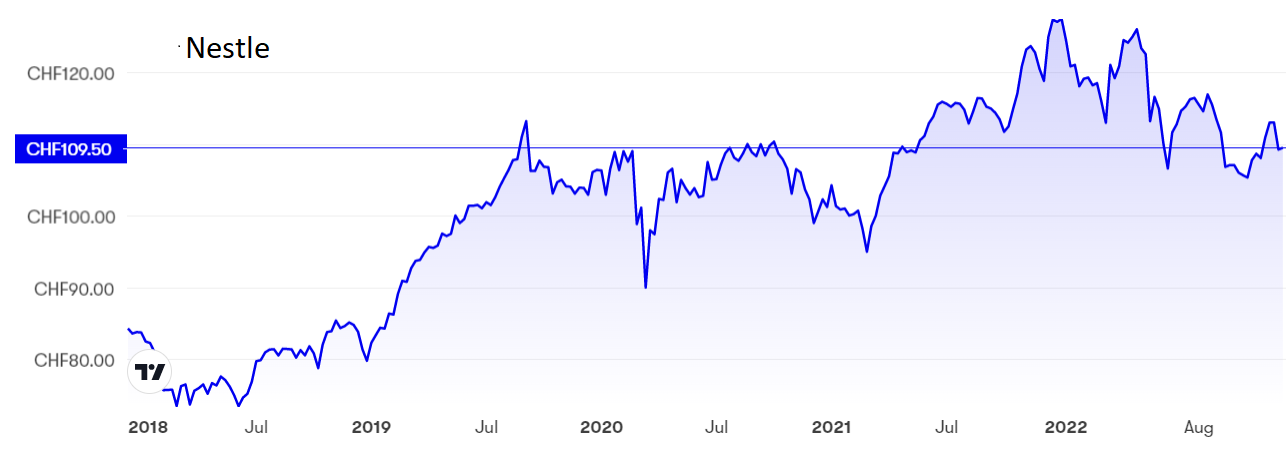A share price drop and plenty of goodwill: time to buy?
14th December 2022 08:32
by Rodney Hobson from interactive investor
One of the world’s biggest companies is expanding its global operations further, but there is significant risk. Overseas investing expert Rodney Hobson explains why and gives his opinion.

One has to feel a sneaking admiration for any company setting up new production facilities in Ukraine, but it does look remarkably foolhardy given the Russian invasion. Swiss food giant Nestle SA (SIX:NESN) has just announced that it is investing – or should that be risking – CHF40 million in just such a move.
Nestle plans a new factory and production network that will employ 1,500 people producing and distributing noodles in and from Smolyhiv in the western part of Ukraine. The network will supply other European countries as well as Ukraine.
- Discover more: Buy international shares | Interactive investor Offers | Opening a Stocks & Shares ISA
The decision flies in the face of moves by other foreign companies to scale back or even close facilities that could be bombed any minute or lose power supplies as Russia, having failed to take Ukraine by force, wages economic warfare.
Yet the Swiss firm, the largest food and beverage manufacturer in the world, is adding to its existing factory at Torchyn to turn the Volyn region into a European regional hub.
It is a daring move that could bring a great deal of goodwill and a strong foothold in a country that offers tremendous opportunities if it can clear out the Russian invaders, but it could be an expensive mistake if, as seems likely at this stage, the conflict in the eastern part of Ukraine turns into a long war of attrition.
But then Nestle, whose brands include Nescafe coffee, Kitkat chocolate, Purina pet food and Maggi soups as well as noodles, is more than willing to splash out. Last month it committed to a $1.8 billion investment over the next 10 years in Saudi Arabia where it already has seven mineral water factories employing 5,000 people.
A new factory will open in 2025 to produce infant nutrition products and ready-to-drink coffee for the Saudi, Middle East and North African markets.
Notwithstanding Saudi Arabia’s dubious human rights record, Nestle stands to gain another wedge of goodwill in a kingdom that is trying to attract more foreign investments in alternatives to the oil that has been its mainstay.
However, it is further away, in North America, where life is looking more rosy for Nestle. Sales were up 11% there in the nine months to September, helping global sales rise 9.2% to CHF63.3 billion. Acquisitions added 1.2% to sales growth. Organic growth picked up in the third quarter to 9.3% from around 8% earlier in the year, making Nestle’s forecast of about 8% for the full year look decidedly cautious despite being an upgrade from the previous forecast of 5%.
The group was able to pass on price increases of 7.5% to offset increased costs, a better outcome than for most food companies in these difficult inflationary times, so it sticks to its expectation of operating profit margins at 17%. Underlying earnings per share for the full year are set to increase, although Nestle has not said by how much.
First-half results were affected by one-off charges including asset writedowns that took 11% off net profits. The second half should show a better bottom line.

Source: interactive investor. Past performance is not a guide to future performance.
Nestle shares had a good run in 2021, reaching a peak of CHF127 in mid-December but they have rather come off the boil since, sliding back to CHF109.50 currently. The price/earnings ratio is a little on the high side but not too demanding at 18.8 and the yield is a decent if unexciting 2.6%.
Analysts are mixed in their attitude to Nestle, with some reducing their buy recommendations to hold, but there does seem to be a general agreement that CHF120 is a fair target.
Hobson’s choice: I recommended Nestlein March at CHF113 though I did warn that the slide could have further to run, as turned out to be the case. However, I stick to my buy stance and the shares are more attractive at the lower price.
Rodney Hobson is a freelance contributor and not a direct employee of interactive investor.
These articles are provided for information purposes only. Occasionally, an opinion about whether to buy or sell a specific investment may be provided by third parties. The content is not intended to be a personal recommendation to buy or sell any financial instrument or product, or to adopt any investment strategy as it is not provided based on an assessment of your investing knowledge and experience, your financial situation or your investment objectives. The value of your investments, and the income derived from them, may go down as well as up. You may not get back all the money that you invest. The investments referred to in this article may not be suitable for all investors, and if in doubt, an investor should seek advice from a qualified investment adviser.
Full performance can be found on the company or index summary page on the interactive investor website. Simply click on the company's or index name highlighted in the article.
Disclosure
We use a combination of fundamental and technical analysis in forming our view as to the valuation and prospects of an investment. Where relevant we have set out those particular matters we think are important in the above article, but further detail can be found here.
Please note that our article on this investment should not be considered to be a regular publication.
Details of all recommendations issued by ii during the previous 12-month period can be found here.
ii adheres to a strict code of conduct. Contributors may hold shares or have other interests in companies included in these portfolios, which could create a conflict of interests. Contributors intending to write about any financial instruments in which they have an interest are required to disclose such interest to ii and in the article itself. ii will at all times consider whether such interest impairs the objectivity of the recommendation.
In addition, individuals involved in the production of investment articles are subject to a personal account dealing restriction, which prevents them from placing a transaction in the specified instrument(s) for a period before and for five working days after such publication. This is to avoid personal interests conflicting with the interests of the recipients of those investment articles.